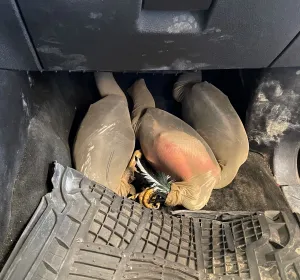LAREDO, Texas – CBP officers and agriculture specialists at the Laredo Port of Entry intercepted live roosters, commonly used for cockfighting, in two separate enforcement actions over the last two weeks.
“On two separate occasions in recent weeks, CBP officers and agriculture specialists made an unusual discovery, roosters deeply hidden within passenger vehicles,” said Port Director Alberto Flores, Laredo Port of Entry. “We remain committed to upholding our agriculture mission, preventing the spread of animal diseases and preventing the exploitation of live animals.”
The most recent incident happened on April 11 at Juarez-Lincoln Bridge when CBP officers referred a pickup truck for a secondary inspection. At secondary, CBP agriculture specialists discovered live poultry in stockings under the front seats and in the center console. CBP personnel intercepted a total of six live roosters.
On March 24, CBP officers at Juarez-Lincoln Bridge referred a pickup truck for secondary examination. During the examination, CBP officers and agriculture specialists encountered four live roosters hidden within the center console of the vehicle. A $300 penalty was assessed to the driver.
The roosters from both seizures were transferred over to the United States Department of Agriculture’s (USDA) Veterinary Services.
CBP would like to remind the public of Animal and Plant Health Inspection Service (APHIS) regulations that live birds, fresh eggs, and raw poultry are prohibited from Mexico as Mexico is affected with virulent Newcastle Disease and Highly Pathogenic Avian Influenza (HPAI). Both of these diseases affect poultry, are serious diseases of concern and are highly contagious. Attempting to bring in these prohibited items would lead to traveler delays and may result in a fine ranging from $300 to $1,000.
On the border at land, air and sea-based ports of entry, including Laredo, CBP officers and agriculture specialists continue to fulfill CBP’s agriculture mission by excluding harmful pests and diseases from becoming established in the U.S. For more information regarding CBP’s agriculture mission, visit the Protecting Agriculture page. More information regarding HPAI or virulent Newcastle Disease can be found at www.aphis.usda.gov/aphis/ourfocus/animalhealth/animal-disease-information/avian/avian-influenza/hpai-home/hpai or at www.aphis.usda.gov/aphis/ourfocus/animalhealth/animal-disease-information/avian/virulent-newcastle/vnd.
Follow the Director of CBP’s Laredo Field Office on Twitter at @DFOLaredo and also U.S. Customs and Border Protection at @CBPSouthTexas for breaking news, current events, human interest stories and photos.


